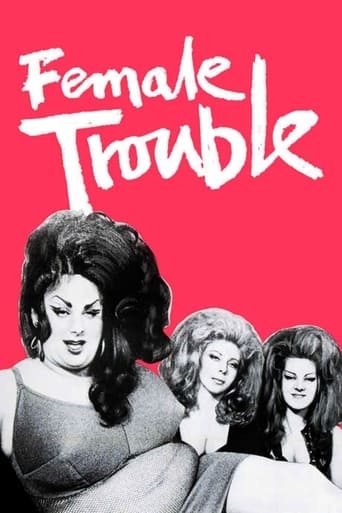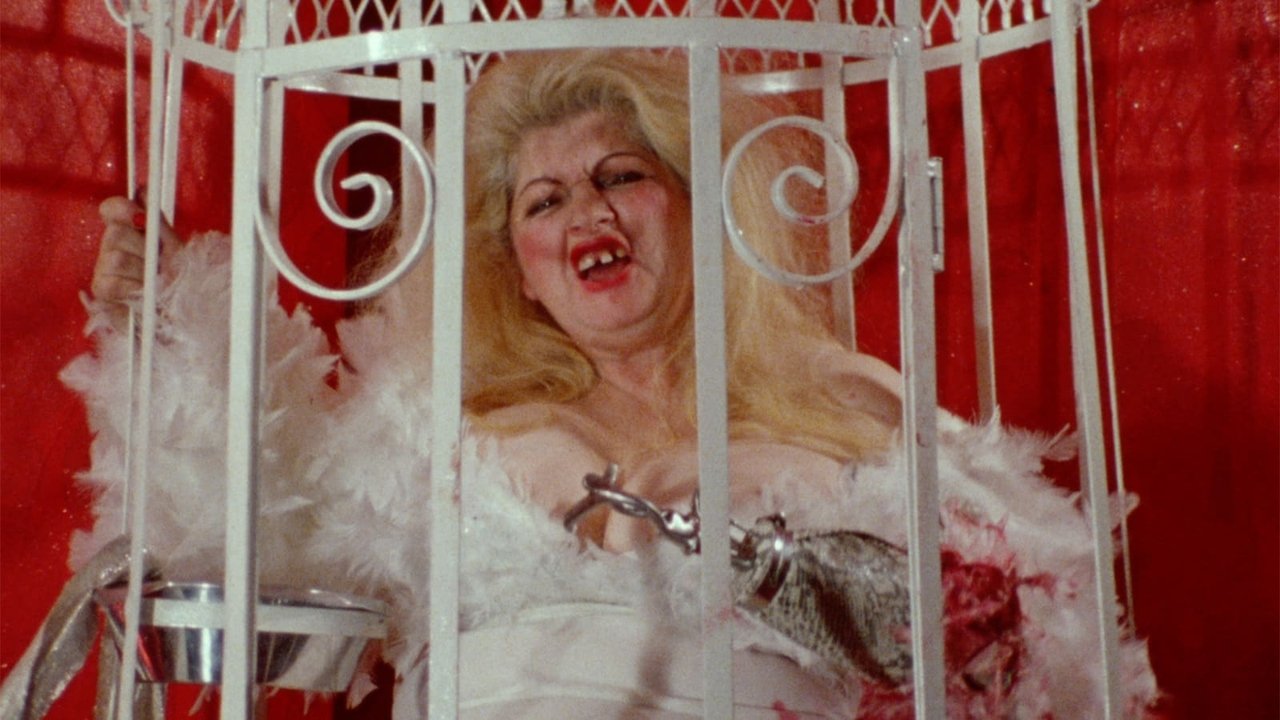mark.waltz
I first saw this film without its soundtrack while at a gay bar in a now gone San Francisco bar, the Phoenix, riveted to the film as disco music pumped in the background. As soon as I returned home to Los Angeles, I had to rent the film to see what I hadn't heard, and I was not bored for a minute. To say that Dawn Davenport had a lot of problems is an understatement. I'm sure she was right down the hall from Tracy Turnblad (of "Hairspray") as these both took place in Baltimore around the same time, so watch it with that thought in mind.Tracy was sent to detention for "a hair don't" while Dawn (the over-sized Divine) was expelled after fighting the girl who tattled on her for eating a meatball sandwich in class. Dawn is then furious when on Christmas day, she opens her present to find sensible lady-like shoes while she wanted "cha-cha heels". A fight with her father follows and Dawn rushes out into the cold in nothing but a coat and a slinky, too-tight nighty. Then, she is picked up by none other than Divine, in male guise, and ravished by him, leaving her pregnant and alone. You'll be mesmerized as Dawn delivers the baby herself, goes from hash slinger to go-go dancer to a part of a mugging ring.Divine isn't the only gross-out character here; There's the enormous Edith Massey, stuffed into a one-piece leather outfit, as the aunt of the long-haired man Divine becomes lovers with. If the sight of Divine having sex with herself/himself isn't enough to drop your jaw, try Massey fondling herself topless then strutting around in this leather sausage wrapper as she begs her nephew to convert to homosexuality. "The world of heterosexuality is a sick and boring life!" she protests, even more aghast by Divine's womanly presence in his life. Daughter Taffy grows up into a Rhoda/Bad Seed/Nellie Olsen like brat who rebuffs her "daddy" then sets off to find her real father, now a disgusting drunk who ends up repulsing her.Their world changes when Massey throws acid in Divine's face, but Divine uses the scars to accentuate what she already feels to be beautiful. I can't really repeat a lot of the dialog here, but even if I could, it would take away the pleasure of hearing some of the most obscene words put together in a reviling type of poetry. The film sort of falls apart when Divine goes on a major crime spree towards the end, but it really is spoofing all of those bad girl 50's and 60's movies, so that's a necessary evil. I can guarantee that while Waters' later films "Hairspray" and "Cry Baby" went on to become Broadway musicals, this one will remain where it belongs, as a midnight cult movie where the somewhat tipsy audience members shout out the lines along with the stars.
johnstonjames
sinfully hilarious, but ultimately totally revolting. as one critic put it, "isn't there a law or something?". i don't think this film actually violated any laws, at least i don't think, most everything was faked here. unlike 'Pink Flamingos'. now i'm sure 'Flamingos' violated some law or another.if you watched this movie you really should face up to the fact that you have a problem. and it's a deviant one. no. ha ha. you probably need help. therapy. i thought this movie was pretty funny too, but it goes way too far in pushing the limits. morbid curiosity isn't everything. didn't curiosity kill a cat or something? at least in this case, turn it's stomach.i like John Waters very much. but he's like Jeckle and Hyde. part sweet, knowing sensitivity, and part demon from the bowels of hell. i think i prefer the sweet side of John better than the other.look. i laughed. God forgive me. but i'm not sure this kind of thing is worth a few laughs. it feels unsanitary. yes there are actually many sophisticated lines of dialog and many real (too real) insights into American society and our troubled times, but still at what cost. this film really does lower the bar in terms of taste. it also makes us too tolerant of deviancy. this movie almost pushes the self righteous, moralizing vigilante in me out to the surface. not a pretty way to feel.i dunno kiddies. trust papa. you're playing with fire here with this stuff. aren't there supposed to be permission slips for this sort of thing? there should be. i don't care what your age.if you want to do this i personally would advise against it, but i doubt i could stop any of you from watching this sort of thing. i guess it's alright. there's worse things out there and it's only a simulated snuff flick. it's alright to do this i suppose if you go to Church, or say a few "hail Mary"s or go seek therapy afterwards. yikes.i didn't know how to number rate this so i just rate it one colossal headache and a pain in the butt.
TBJCSKCNRRQTreviews
I watched the 97 minute version. This and Pink Flamingos was lent to me by a friend of mine, and they are my first and only exposure to Waters, other than his guest appearance in an episode of The Simpsons and his role in Seed of Chucky. Well, I'm not a fan. I would have to say that this is the better of the two. Instead of being one long excuse to shock and put the nastiest things they could think of onto the screen(this may have the same amount, but in a much lesser range), this has genuine plot and even sort of a point... crime as beauty(seemingly related to Charles Manson and his "family"), and the pursuit of the latter. Well, yeah, it's *strange*... remember who we're dealing with. The substance does help this considerably(a little absurd stuff is better than absolutely nothing). There are a couple of funny lines(such as the one in my summary), if on the whole, I didn't find this humorous(the "don't want eggs" bit was amusing), only offensive. Not a lot of it is in the language, it's largely visual and in the occurrences. Divine is yet again wearing excessive make-up, and again there are characters with odd names wearing weird clothes and hair being obnoxious and not necessarily credible. While the dialog is not as repetitive, and doesn't feel as improvised and "ok, guys, we only have time for one take so keep going if you flub a line" as in the earlier movie, it's not impressive. Performances are decent, same for the FX. This has a little good music. The technical aspects remain underwhelming. There is a moderate measure of sex and full frontal nudity of both genders in this. I recommend this to those who enjoy John's work, or find what I describe here to be appealing. 6/10
sandover
There are very few films of sublime bad taste."Female Trouble" transcends even that.The moment Divine asks "Who wants to die for Art?", and after somebody from the audience stands up, says yes, and Divine starts shooting, something really unnerving happens: we pass from fierce satire - and as satire goes, the confines of the social - to the realm of the unconditional. We are not back into Breton's old surrealist adage "a surreal act is to get out and start shooting people", with its haughty, bourgeois accent, but in a new territory that challenges even that! I still cannot fathom this shifting of gears which exposes our pretensions, if not our infection; John Waters is accustomed in making categories collapse, and oppositions fall into each other, but this is unprecedented and followed by an assault that ends up in picturing Divine as a preposterous conversion of Dreyer's "Joan of Arc"! I would put this gem in the rare American tradition which starts with Gertrude Stein's Ida, a bizarre writing about the modernistic sainthood of fame and its vicissitudes. John Waters and his Divine saint make that miracle happen again: a sublime collusion between fame and shame, saint and quaint, and somehow a cry for affection.


 AD
AD






